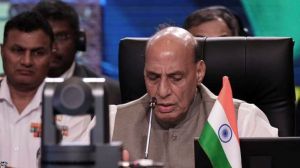Govt pressures FIs on steel company bailouts
NEW DELHI, JAN 15: Several months after the financial institutions (FIs) first opposed moves to work on bailout packages for the beleague...

NEW DELHI, JAN 15: Several months after the financial institutions (FIs) first opposed moves to work on bailout packages for the beleaguered steel industry, the Ministry of Finance is once again insisting that it re-opens the matter. Last week, Finance Minister Yashwant Sinha and his advisor Mohan Guruswamy convened a special meeting with the heads of financial institutions to discuss the matter further. Among others, specific loan packages for companies such as Essar Steel were discussed.
Interestingly, officials of the finance ministry such as finance secretary Vijay Kelkar were not called for the meeting either. The financial institutions were represented in the meeting by IDBI chief G P Gupta, and UTI chief P Subramanyam. When contacted, IDBI chief G P Gupta was evasive, refusing to comment on what transpired, and said: “Please talk to the finance ministry.” Subramanyam refused to comment on the matter.
When contacted, finance ministry officials denied that any special loan packages had been workedout for individual companies, but that the overall need for increased sectoral loans had been discussed. What had also been discussed was ways in which various promoters would have to bring in more funds, since the institutions were obviously uncomfortable with the very large exposures that they had to the sector.
After several representations by the steel industry, the ministry had constituted a working group which looked at various ways in which to bail out the industry last month. This group, however, had primarily worked on the anti-dumping complaints of industry and had made recommendations such as setting floor prices for steel imports — the industry had been complaining that it was suffering badly due to dumping of steel from abroad. Following this, however, steel companies had continued to ask the ministry to deal with their problems of lack of capital and to get the FIs to be a bit more lenient.
It is believed that while IDBI has been asked to work out the details of a Rs 2,000 crore packageduring last week’s meeting, Essar will also be asked to bring in more funds of its own. Options discussed in the meeting include selling off of Essar’s power plant as well as possible selling off part of its proposed refinery to a strategic partner. The institutions have also been asked to seriously consider the possibility of rolling over some loans which are coming up for repayment soon. Essar Steel, for instance, has $250 million of foreign rate notes which have to be redeemed before July. For this, it has been planning to raise $400 million abroad, but this looks impossible given the current state of the market and the negative perception of the steel industry globally. This money would now have to come from other sources, including possibly the FIs.
FI sources said that the crux of the problem remains the same as it was when they first objected to any further loans to the sector. For one, there is an overall sectoral loan limit which has been reached in the case of the steel sector — under this, FIsare not supposed to lend more than 15 per cent of their total outstandings to any sector. Including the banks, the total exposure to the steel sector is a whopping Rs 40,000 crore. Besides, said a top-level FI official: “In most of these steel companies, we have also reached the recommended exposure levels.”
FIs are also not comfortable with the proposal that promoters of steel companies pledge their shares with them while taking more loans. For one, with these companies already in very bad shape financially, the shares in themselves don’t mean too much. Secondly, given the manner in which various governments over the years have tended to side with sitting managements, it was unlikely that the FIs would be able to change the managements in case of further defaults. In any case, effecting a management change to get their money back is certain to be fraught with risk, apart from being a long-drawn affair.






- 01
- 02
- 03
- 04
- 05

























